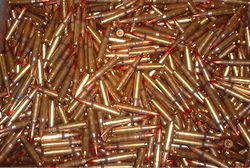Ammunition
Ammunition (or ammo) is a generic term derived from the French a la munition, which embraced all material used for war, but which came to specify gunpowder and artillery. The term for all types of ammunition is munitions, also from the French. The French are great at devising words for ammo, as opposed to—well, let's not go there.
Scope[edit | edit source]
Ammo comprises application of fire to targets, general use of weapons by personnel, explosives, propellants, projectiles, shaped-charge forms of attack on armour and aircraft, mortar ammunition, grenades, and swell fireworks shows.
In the widest sense, ammo covers anything that can be used to mess people up. That includes missiles, zombies, asploding puppies, toilet bowls, forks and other bits of silverware that you can jam in a pirate cannon, and sausage-to-air missiles.
It also covers mines (landmines, naval mines, air mines, swamp mines, anti-personnel mines, and French mimes) that munitions factories build.
Ammo also refers to the Royal Air Force career field, who pride themselves in drinking beer, shouting and turning wrenches. Off-duty, by comparison, they just drink beer and shout.
Terminology[edit | edit source]
A cartridge is a single unit of ammunition: the combination of bullet, propellant, primer, and case. Nintendo games used to be called cartridges until someone corrected the Engrish and informed the Japanese that guns are not toys.
A round is a synonym for cartridge. It is also how Barnwell's Ma describes being "in shape." Well, round is a shape.
Large-caliber guns often fire explosive-filled rounds known as shells. Non-explosive shells may be used for practice. Shells found on the beach make excellent homes for hermit crabs and they also make a nice macramé necklace for your girlfriend on Valentine's Day. Some of these sea shells are C shells and some are Korn shells.
Large amounts of ammo to be fired in a single shot are called shot; small arms for this ammo are called shotguns. The sounds that shotguns make are called shots. During the flu season, nurses administer shots, often into small arms. Other shot, such as buckshot, is not effective against the flu. When a porn star fires his ordnance, it is called a money shot. This munition is non-lethal, usually. The Beastie Boys have a song called Sure Shot. It is not popular.
Duds are asplosive-filled ordnance where the ordnance fails to asplode. A cartridge that fails to fire in the weapon is known as a misfire. Dud ammunition is highly dangerous and is also known as UXO (from the Latin uxor, or wife). Deeds are often made out in the name of a person et ux., if his spouse is da bomb. She would be Mrs. Fire.
Safety officials advise civilians to report finding any large-bore duds to the police or military. The British had a television program on UXOs, only it was known as UXB, and it was a large bore, leading the entire island nation toward trainspotting instead.
Ammo bases[edit | edit source]
An ammo dump, ammo compound, ammo dépôt, Munitions Storage Area (MSA), or ISO village, is a storage facility for live ammo. Ammo troops also go there to hang out between paycheques. The storage of live ammo and explosives is inherently hazardous, especially when you see the trained monkeys that get paid to do the job. There is the potential for accidents in unloading, packing and transfer. Highly trained high-school drop-outs who have recently quit smoking dope (but still smoke tobacco in the vicinity of the ordnance) enlist in the Chair Force. Ammo bases carry the threat of theft, misuse, or sabotage, and if neglected, the near-certainty that poorly stored explosives will degrade and become shock-sensitive over time.



